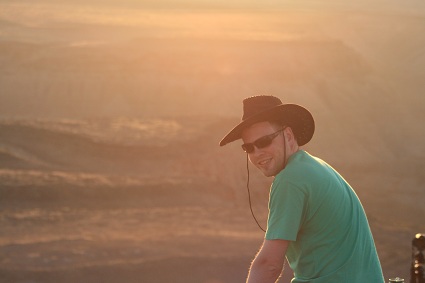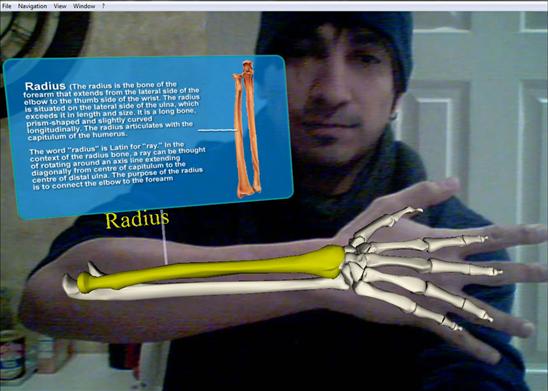
Jim Peters is the developer of the cross-platform, open-source binaural beat generator SbaGen. Although the application has been available for free online since 1997, an commercial application called I-Doser, which used SbaGen’s source code without permission, has been in the news lately. I took the opportunity to ask Jim a few questions about binaural beats and his program.

Can you tell us a bit about binaural beats and how they work?
The mechanism behind binaural beats is very simple — on the face of it, at least. Two pure sine-wave tones are fed to the brain, one in each ear. For example, you could play a 200Hz tone to the left ear, and a 210Hz tone to the right ear. The end result, as far as the listener is concerned, is that they hear a tone of 205Hz but pulsating or ‘beating’ at a frequency of 10Hz. This 10Hz stimulation is what leads to the entrainment.
This could be viewed as simple wave interference, but actually it is a lot more complex than that because the sound waves never get to mix in the air. They do not meet until they have already been converted into
signals in the nervous system of the brain.
Our hearing centres do a lot of complex processing on the sounds that we hear, especially to determine the direction and distance of objects in our environment. If an object is to our left, then sounds from that object arrive first at the left ear, then slightly later at the right ear. There is a part of the brain dedicated to detecting these delays which gives us our sense of sound direction.
When the brain is fed tones of slightly differing frequency, this is interpreted as a sound with a delay that is constantly changing. The direction-detection part of our brain reacts to this sound, resulting in the beating effect that we perceive.
Directional hearing is a very low-level, primitive function of the brain, and the centres dedicated to it are right on the brain stem (the ‘superior olivary complex’). This means that causing a beating stimulation here with binaural beats has the potential to cause entrainment effects quite different to those produced by light glasses or other methods of entrainment. Certainly it is valuable tool.

Binaural beats diagram from Everything You Ever Wanted to Know About Binaural Beats
How did you first learn about binaural beats?
I first heard about binaural beats through attending a workshop with Ken Eagle Feather (Kenneth Smith), a Toltec teacher. He had been a test subject in the labs of Robert Monroe.
Why did you decide to create SbaGen?
I wanted to experiment with binaural beats, so the obvious thing to do was to create a tool to allow me to do that. However, I now realize that I am not a genius like Robert Monroe! It is one thing to build a tool that generates tones to a high standard, but quite another to have the inspiration to create sequences that take people to other places. This is like the difference between a musical instrument maker and a virtuoso player. So, whilst I’ve been able to create the tool, I have to leave it to others to create interesting sequences.

SbaGen screenshot
What programming language is it written in?
It was originally written in C for Linux /dev/dsp, a long time ago when a fast machine was a 75MHz Pentium and I was still thinking like an assembler programmer. So, apologies for any poor style! Over the years it has been adapted for Windows and Mac, and even things like Blackfin boards. It uses integer-only arithmetic, even for MP3 and OGG decoding, which is an advantage when porting to ARM, for example.
However, modern processors are capable of a lot more and if I were to rewrite it today, I’d consider the use of other techniques.
What happened with I-Doser and SbaGen’s source code?
As far as I can gather, the guy behind I-Doser calls himself Christopher Canavan, based on messages to the SBaGen list and WHOIS data. It seems that he had a bright idea of how to make lots of money from binaural beats, and he contracted some programmer “for hire” to develop a GUI wrapper around SBaGen that added encryption and some means of packaging sequences. However, he did not pay any attention to SBaGen’s GPL license — he just took what he wanted.
As it happens, he violated the SBaGen license by modifying it and not redistributing the source code of the changes, as required by the GPL. With a little more care, he could have got what he wanted without any
license trouble or payment.
For a long time I knew nothing about this. Then I started getting E-mails from SBaGen users bringing the problem to my attention. I could see that I was dealing with someone who was a bit shady, and I really didn’t look forward to having to negotiate with him, especially as I am based in the UK and he is based in the US. Eventually the pressure from users was so much that I had to act and try to resolve the issue.
I’m sure that Christopher Canavan (or whoever he really is) is making huge amounts of money from I-Doser — I’ve heard stories of individuals spending hundreds of dollars. I’m also sure that with enough money spent on lawyers I could have had a large slice of his cake. But in our discussions he gave me the impression of being completely evasive and untrustworthy. I considered the stress and cost of protracted legal action in a foreign country, and decided on something symbolic instead. On moral grounds, I’m not sure that I would have wanted a slice of his cake in any case.
So I settled for putting the source code in order, and him paying me $1000 (which he paid without hesitation), and having a link from his site to mine so that there was a ‘way out’ for people looking for more information.
I-Doser has gone global — I’ve heard reports of worried parents and officials from as far away as Russia and Korea. What I-Doser has done is very clever from a business and marketing point of view, but also quite corrupt (in my eyes). But then you could say the same of Coca Cola or McDonalds. You can see why I am not a successful businessman!
Coil – “Methoxy-N, N-Dimethyl,” from their album Time Machines
Do you believe that I-Doser can actually deliver on their promise of providing a variety of discrete recreational psychoactive experiences? My own experience working with SbaGen, Brainwave Generator, and sound and light machines is that it does feel like “something happens,” but I haven’t found that the specific experience each one is aiming for (“relaxation,” “creativity,” “stimulation,” etc.) In fact, I actually conducted some controlled experiments with classmates as a research project in college. We investigated whether the “intelligence enhancement” setting of a particular sound and light machine was effective at improving MENSA test exam scores. We didn’t get statistically significant results.
No, I don’t believe that I-Doser can deliver on their promise. If I hit you over the head with a mallet you will see stars, but that doesn’t mean that you’ve had a marvellous journey through the universe. However with a good enough sales pitch maybe I can make you believe that you have.
I-Doser uses quite high-amplitude binaural beats, much higher than is recommended by organizations such as The Monroe Institute or CenterPointe, where the beats are generally only just audible under the soundtrack.
I guess you could compare I-Doser’s use of binaural beats to typical teenagers’ use of substances like alcohol — i.e. excessive. Actually, I think that this may be the key to it. For some reason people of that age are attracted to self-destruction in various forms, and I-Doser are tapping into that with their fantastical and exaggerated descriptions of their sessions’ properties. It is on about the same level as teenage experimentation with alcoholic drinks.
Whether listening to high-amplitude binaural beats does any harm, I really don’t know. But would the harm be more or less than the harm done by getting completely intoxicated with alcohol? Who knows.
In some ways I am sad to see binaural beats used in this way, but on the other hand it does raise interest in a tool that is very valuable for people who are past their teenage self-destructive phase and who are looking to do something rather more constructive.
There is great potential for new research combining binaural beats with other techniques such as biofeedback or EEG. By a happy accident, nature has provided us with a direct signal feed into the brain stem without any surgery required!
The applications of binaural beats are varied, but they will never be a ‘silver bullet’ to instantly give you high MENSA scores or whatever.
I’ve heard from Buddhist monks who found that binaural beats took them to places in consciousness that required years of meditation to reach by normal means. But again this sounds better than it is — they were
practiced meditators, so they could follow the guide provided by the beats to reach those places. Someone who is not practiced in meditation would fall asleep or pop out of entrainment under the same conditions. Meditation takes time to learn, but binaural beats can be used as a guide for practice.
The late Robert Monroe used binaural beats, sometimes combined with flotation chambers and sensory deprivation, to guide people to places he knew from his journeys out-of-body. This could be seen as another
form of meditation.
Then there are organizations such as CenterPointe who see binaural beats as a means of emotional cleansing. They use both carrier frequency and beat frequency to plot a 2-D map, which they traverse slowly, session by session, stimulating and clearing blocked emotions. I can testify to the strength of some of these clearing effects through my own experiments with similar sessions. ‘Overwhelm’ is a condition where you have stimulated too much emotional material, and you feel half-crazy and a bit on the edge. The advantage that binaural beats have in this application is that they are 100% under your control. You choose how often to listen, or when it is time to have a few days break to let things calm down again.
I have even heard from someone who lives in constant pain due to a spinal injury who found that binaural beats of a certain frequency allowed him to sleep. He appreciated the way that he could tune the frequency very precisely to meet his needs.
Again, it is the precision, controllability and repeatability of binaural beats compared to other means of influencing the organism that give them a real advantage here.
Are you still working on SbaGen? Will there ever be a GUI?
Unfortunately I don’t have time to work on new features due to having to earn a living. Whilst I would love to write a GUI, I think that realistically other things are going to get my attention before that in the limited free time that I have. So, unfortunately probably not.
Have you considered creating an iPhone or Android app?
No, sorry.
Further Resources
I-Doser doses reverse engineered for SbaGen
Monroe Institute entry on WikiPedia
Gnuaral Another cross-platform, open-source binaural beat application
Technoccult interview with HipGnosis, an electronic musician who uses binaural beats in his work.












































